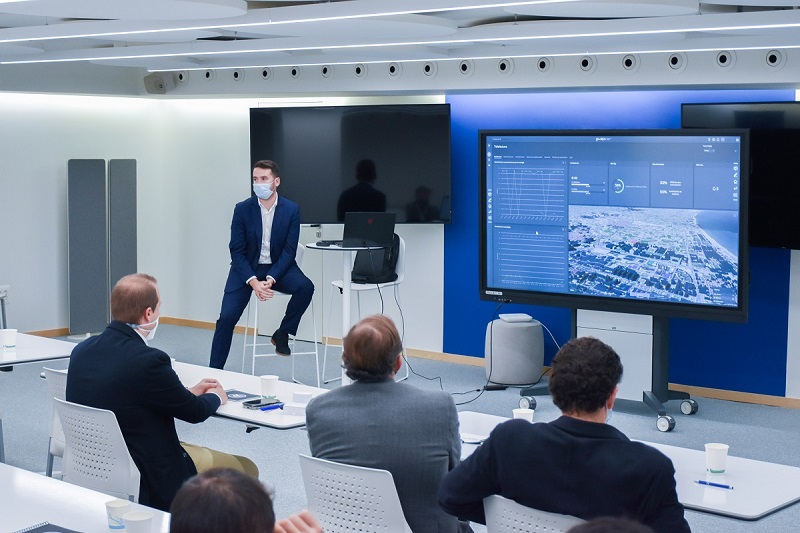Idrica has developed the first 5G-NR device specifically for the water industry. This groundbreaking piece of equipment, based exclusively on 5G-NR (New Radio) technology, will provide solutions to challenges which had been out of reach up until now, mainly in Massive IoT scenarios, with millions of devices connected in very small areas.
The breakthrough will also make devices more energy efficient, guarantee service in adverse conditions, and reduce latency to milliseconds in the management of critical infrastructures. These are just some of the many advantages of 5G-NR technologies, which include network slicing and edge computing.
The device has been designed, engineered and manufactured in Valencia, where Idrica has led all phases of development alongside FiveComm, the company in charge of hardware development. The project got underway at the end of 2020 and, over the course of 2021, progress has been made on board and component design.
Idrica’s Instrumentation & Smart Metering Specialist, Carlos Tejedor said: “The global chip supply crisis has been a real challenge, but we have continued to persevere, and manufacturing was successfully completed after the summer. We now have fully functional operational devices deployed.
“In the future, there are going to be millions of sensors connected in very small areas. 5G technology is far superior in terms of capabilities to any of the existing technologies applicable to the water industry, specifically smart meters, ” said Tejedor, who pointed out that “its implementation in end-to-end water management will enable us to read consumption in real time, detect events such as network failures and leaks much earlier and resolve them faster”.
Implementing 5G-NR in remote water reading, a pioneering pilot project
This technological innovation is part of the pilot project that is being carried out in Valencia to assess the benefits of 5G-NR technology in real-time remote reading of drinking water consumption. The scheme focuses on analyzing the advantages of 5G-NR over NB (NarrowBand).
The pilot applies 5G-NR to smart metering to simulate a scenario of millions of connected devices (Massive IoT). Thirty water meters have been selected on the Universidad Politécnica de Valencia’s campus. They have been chosen because they are located in areas of poor coverage and difficult access, such as basements, underground passages and parking lots.
“These water meters are equipped with NarrowBand technology with the data being transmitted to our GoAigua solution. At the same time, 5G-NR devices have also been deployed,” said Tejedor, who pointed out that “at the moment, some of the meters are working with both technologies”.
In addition to comparing the two technologies, the meters selected on the university campus will be monitored to check whether they are working correctly as smart meters, whether the infrastructure communicates and sends readings, the extent of sensor implementation, and the quality of the data signal at specific depths. Water consumption and the energy management of the devices will be analysed, and alarms triggered by leaks or poor data communication will be monitored.
The 5G-NR device developed by Idrica in this first phase of the project was recently unveiled to the pilot’s partners and associates: Orange (leading the joint venture), Global Omnium, and Fivecomm. A small-scale demonstration of the pilot took place at the meeting.
According to Andrés Herranz, Orange’s Eastern Spain Public-Sector Sales Manager, there are several advantages of 5G technology, including speed: “we can expect to reach speeds of 10 gigabytes, which can even put us ahead of fiber in some aspects. Lower latency, i.e., the time required for data transfer, is another advantage together with the ability to connect millions of devices at the same time (Massive IoT), and the potential to reach remote areas which have poor coverage. Herranz also points out that “we are very interested in integration. Under this umbrella, many other technologies will be able to coexist”.
National 5G plan
The pilot project, which is also a world first, is part of Spain’s National 5G Plan, implemented by the public-sector corporation Red.es, promoted by the Ministry of Economic Affairs and Digital Transformation, and co-funded by the European Regional Development Fund (ERDF). Idrica is working on this initiative with Orange (which is leading the joint venture for this pilot project). Other companies supplying equipment and services such as Arborea Intellbird, CFZ Cobots, Etra Investigación y Desarrollo, Visyon (Grupo Mediapro), Elewit and Robotnik are also taking part in the initiative.
Do you have an article or video that you would like to share? Submit your article here or keep up with the latest news from the water industry and wastewater industry by subscribing to our weekly newsletter.







